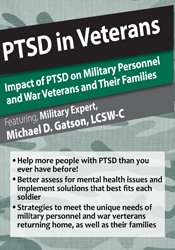
| File type | File name | Number of pages | |
|---|---|---|---|
| Manual (1.84 MB) | 62 Pages | Available after Purchase |

Michael D. Gatson, PhD, is a renowned expert in military psychology/social work and issues related to military mental health. He brings with him an extensive wealth of knowledge as well as personal experience, having served in the Army Medical Reserves as a suicide prevention officer, sexual assault coordinator, and hospital administrator. Dr. Gatson is mental health program director at the Maryland VA Health Care System, contributing faculty in the online MSW program at Howard University, and lead faculty/assistant professor in the Barbara Solomon School of Social Work at Walden University. He is the author of Now I Lay Me Down to Sleep, a children’s book that explains the aftermath of war from a child’s perspective, and he has published in several professional journals on PTSD, suicide prevention, and LGBTQ military consultation, workshops and training to behavioral healthcare providers.
Speaker Disclosures:
Financial: Michael Gatson has employment relationships with Annapolis Vet Center, Walden University, and the Catholic University of America. He receives royalties as a published author. Michael Gatson receives a speaking honorarium and recording royalties from PESI, Inc. He has no relevant financial relationships with ineligible organizations.
Non-financial: Michael Gatson is a member of the American Society on Aging, the National Association of Social Workers, the American Psychological Association, and the Society for Advancement of Violence and Injury Research.
Access never expires for this product.
Military Culture
PTSD Among Military Personnel and War Veterans
Co-occurring Disorders Among Military and War Veterans
Assessment & Evidence Based PTSD Interventions
PTSD and the Families
Practical Treatment Strategies with Families
How to Work Successfully With Military Personnel and War Veterans
| 5 |
|
| 4 |
|
| 3 |
|
| 2 |
|
| 1 |
|
Satisfaction Guarantee
Your satisfaction is our goal and our guarantee. Concerns should be addressed to: PO Box 1000, Eau Claire, WI 54702-1000 or email info@pesi.com.au.
Please wait ...